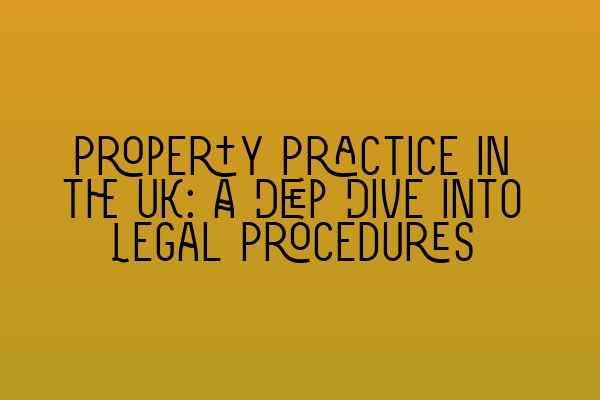Property Practice in the UK: A Deep Dive into Legal Procedures
Property law in the United Kingdom is a complex field that encompasses a wide range of legal procedures. Whether you are buying, selling, renting, or investing in property, having a deep understanding of these legal processes is essential to ensure a smooth transaction and protect your rights.
In this comprehensive guide, we will take a closer look at the various legal procedures involved in property practice in the UK. From initial research and due diligence to completion and post-completion formalities, we will explore each step in detail, providing you with valuable insights to navigate the intricate world of property law.
Research and Due Diligence
Before engaging in any property transaction, thorough research and due diligence are crucial. This involves conducting searches to gather information about the property, its title, any restrictions or encumbrances, and potential planning or environmental issues.
One essential search is the Local Authority Search, which provides details about planning permissions, building regulations, and any enforcement notices or proposed developments in the area. Additionally, Land Registry searches are conducted to verify the property’s registered owner, any existing mortgages, and any other interests affecting the property.
For a more comprehensive due diligence process, it is advisable to seek the assistance of an experienced property law solicitor, who can analyze the search results and advise on potential risks and issues.
Preparation of Contracts and Exchange of Contracts
Once the research and due diligence are complete, the next step is to prepare the sales contract. This contract outlines the terms and conditions of the property sale, including the purchase price, completion date, and any additional provisions agreed upon by the parties involved.
Both the buyer and seller’s solicitors will review and negotiate the contract to ensure their respective client’s interests are protected. Upon reaching an agreement, the contracts are formally exchanged, and both parties become legally bound to complete the transaction on the agreed terms.
The exchange of contracts is a pivotal moment in the property transaction, as it solidifies the agreement and provides certainty to both parties. At this stage, the buyer typically pays a deposit, usually 10% of the purchase price, which is held in a designated account until completion.
Completion and Post-Completion Formalities
Completion is the final stage of the property transaction, where ownership of the property is transferred from the seller to the buyer. On the agreed completion date, the buyer’s solicitor transfers the balance of the purchase price to the seller’s solicitor, and the keys are handed over.
Following completion, there are several post-completion formalities that need to be addressed. The buyer’s solicitor must register the property transfer with the Land Registry to update ownership records. If there is a mortgage involved, the buyer’s solicitor will also register the lender’s charge against the property.
Additionally, the buyer’s solicitor will inform the relevant authorities, such as the local council and utility companies, of the change in ownership to ensure the smooth transition of services.
Conclusion
Property practice in the UK involves a series of legal procedures that require careful attention to detail and expert knowledge of property law. By understanding the intricacies of research and due diligence, contract preparation and exchange, completion, and post-completion formalities, you can navigate the property transaction process effectively.
If you’re preparing to embark on a property transaction, it’s always advisable to seek professional advice from a qualified property law solicitor to ensure compliance with the law and protect your rights as a buyer or seller.
For further preparation and resources related to the SQE exams, you may find the following articles helpful:
